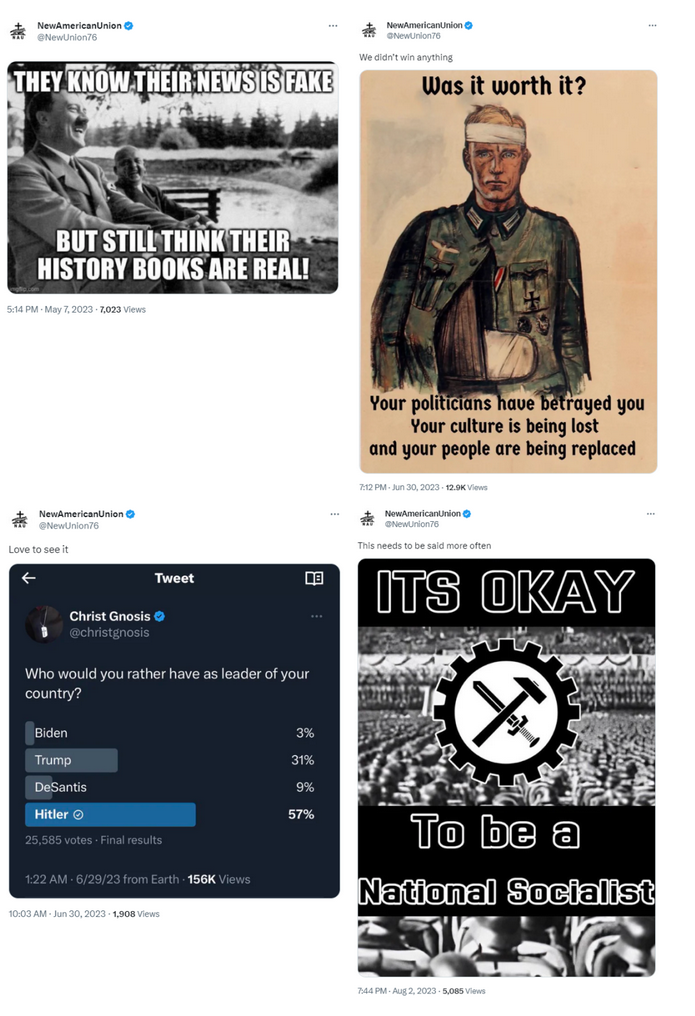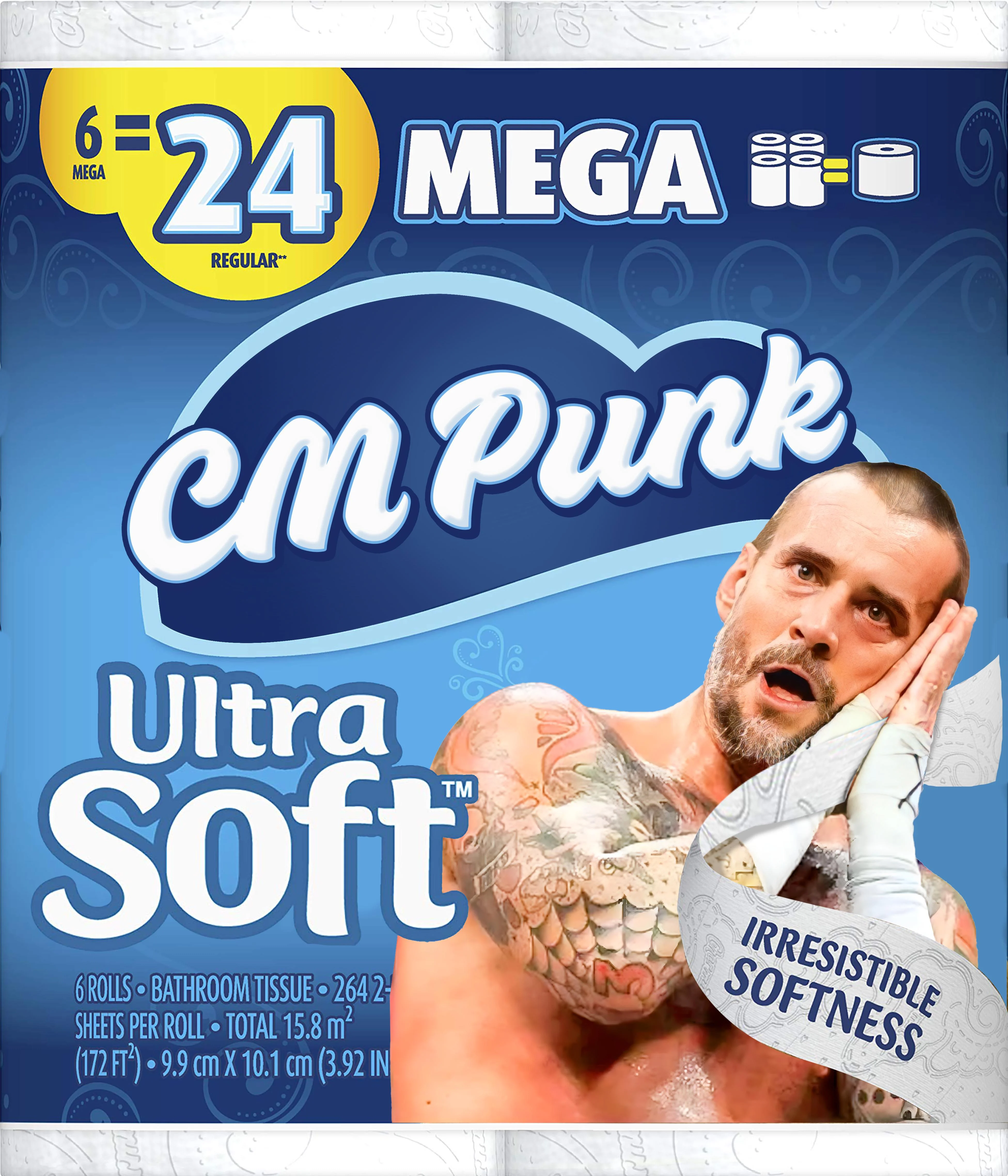Free speech is good and must be protected, that’s clear. But it should not be virtually limitless. The US played a major role sorting out the negative consequences of the Weimar republic, which did not contain fascist ideology, which then (edit: among other things ofc) lead to WW2.
It still baffles my mind how the US cannot see that tolerating the intolerant must inevitably lead to an intolerant and possibly facist society.
I have thought about it for a while but the US is basically in a cold civil war, with a significant chance of it becoming hot. And it looks very similar to their previous one. Neither side seem to have a charismatic enough leader.
It’s easy to look over the pond and think it’s none of our problem. But if the US falls to chaos a lot of other countries will follow suit. We can already see this influence in the UK and I’d argue many other EU countries. Russia probably saw this weakness, bet on it worsening much quicker than it did, but lost that bet (so far).
With that said, addressing the US as a whole no longer makes sense. I’m sure plenty, plenty of Americans see what is happening.
It’s unfortunate that one of the wealthiest people on this planet has taken the anti-democratic side, but it’s not the first or the last time in history a powerful man, rich beyond measure has done so.
Very much so, the Bavarian Conservative Party literally has gone to have talks with republicans to use their election strategies, the German-wide AgD has ramped up their Anti-LGBT campaigning and started to use similar messaging to far-right propaganda networks, e.g. “protect our children”, “pedophiles”, photoshopped images of CSAM at pride events, etc.
All the conservative parties in the west seem to be pushing the same thing. It seems pretty co-ordinated which is even scarier. Every country is hearing the same talking points.
Yep, it’s very clear. Far right parties are growing, conservatives are running after them trying to keep their voters by using more and more populist tactics, often crossing the line to keep up with far-right talking points, since they can’t keep their voters with their status-quo, corporations-first policies that they’ve been pushing for decades.
Yeah the Tories in the UK which were once the mainstream right are now sucking deeply on the crack pipe of Republican culture wars because after thirteen years in power it’s all they have left.
are now sucking deeply on the crack pipe of Republican culture wars
As are the conservative parties in Canada.
Until recently the federal conservative party had one of Trump’s co-conspirators listed as someone they had worked with. As so as he was indicted, thwy rapidly and quietly removed any mention of him.
deleted by creator
Steve Bannon was quoted as wanting to create an “international network of nationalists”
An international group that advocates for not cooperating across international lines?
That (hopefully) seems doomed from the outset.
It does. I think what he really means though is an international group of spin doctors who mobilise nationalist sentiments.
Probably in service to Disaster Capitalism.
Absolutely that, and fascism
Years ago I worked for a guy who came from old old money. He told me that he believed that something like the Illuminatti was real based on the notion that really wealthy people have similar goals everywhere and frequently interact. At the time I thought he was crazy but now Im less sure.
Well its not conspiratorial to say right wing organizations meet and collaborate.
I think they try and see what works to push their agenda of consolidating power and protection for the rich at any cost.
Orban was at Cpac
Wtf, csam photoshopped in? So gross and evil. How are people not arrested - idk about other places but i thought it is illegal in us to own it at all. So if someone photoshopped it - they should be in jail.
My country (Australia) has tied itself to you guys so if you go down we definitely go down with you. I’m 100% hoping the US doesn’t fall into chaos. We also birthed Rupert Murdoch and he’s played a huge part in heating up this civil war.
y’all can just flip to china and they’ll treat you really nice to try and placate future potential allies
at least… for like a decade or two
Nah we just signed a big pact with the US and UK and now we’re buying all their hand me down helicopters and shit.
China’s still one of your major trading partners, though.
They are but things are definitely getting hot with China. There’s also been some issues with trade and diplomacy since our ex PM publicly called for an investigation into the origins of covid. China did not respond well to that and our previous government’s approach to diplomacy didn’t help. At one point China actually wasn’t answering calls from us.
We are walking a very fine line because we absolutely depend on trade with China but we’ve also entered in an alliance for the explicit purpose of preparing for a potential conflict with China. There’s absolutely no reality where we side with China over America. We would destroy our economy before we back out of our alliance with the US. We have followed them into every war since ww2.
Oh, yeah I know you wouldn’t. You’re in kind of a tricky situation but I think that spat over covid sort of tested boundaries for you.
I’m in Aotearoa, obviously we have a similar problem. Culturally we would go where you go, but on the other hand we didn’t follow the US into Iraq. China are by far our biggest trading partner, and also those of us with a long memory were disillusioned by how our allies treated us over the Rainbow Warrior terrorist attack so there’s probably not the same level of confidence.
Russia probably saw this weakness
Good ol’ “Foundations of Geopolitics” by Aleksandr Dugin. https://en.wikipedia.org/wiki/Foundations_of_Geopolitics
Russia probably saw this weakness, bet on it worsening much quicker than it did,
And helped it along as much as they could get away with.
It’s safe to say Russia and China have actually helped contribute to a lot of the issues in the last decade by holding a lot of soft power online. The US government can’t stop an enemy that blends in with their sovereign users, advertisers, and content creators.
The problem is free speech absolutism is very popular here with dumb dumbs.
Correction: fake free speech absolutionism of Musk where he gets to decide who gets censored for their opinion is very popular with dumb dumbs.
Free speech is good and must be protected
I agree, but Twitter has nothing to do with free speech. Period. It’s not like the government is going around throwing people in prison for being racist fucks on Twitter. Twitter can moderate content if they want to. If they don’t want to moderate content they don’t have to as long as the material isn’t illegal.
I don’t know why people keep thinking this has anything to do with the first amendment at all. Twitter is not public, not even close.
I agree, but Twitter has nothing to do with free speech.
Twitter positions itself as the Internet’s public square, and free speech certainly does apply in an old-fashioned offline public square, so yeah, Twitter kinda does have something to do with free speech. Don’t seek power if you don’t want the responsibility it comes with.
There’s no such thing as “the internet’s public square”. It is the “X-owned public square”. In an offline public square, the government owns the square, so free speech protections apply. But this “square” is privately owned. There’s an incredibly fundamental difference here.
That’s not how it works, what you are talking about is often called freeze peach.
Until Twitter can fine you or lock you up for saying the wrong thing or exercise prior restraint over all your expression, it’s not a free speech issue.
By positioning itself as the Internet’s public square, Twitter seeks a monopoly over public discourse. If it is successful, then yes, it can exercise prior restraint over virtually all of your expression.
It can succeed in that endeavor the moment I become unemployable. I’m not making an account there, never will, and I will die on this hill.
I think you’re mostly right but there’s a host of nuance and legalese that muddies this up. Social media is always in a conflicted relationship with speech, wanting to have no culpability over what’s posted while also making decisions over what to feature/restrict/etc. They’re actually really cautious to not position themselves as the “town square” for that reason since it does channel a sort of legal definition of such.
Since it is Musk that manages the “Internet’s public square”, it isn’t a public square at all.
You’re partly right. But it’s the job of the citizenry to stand up to this stuff, not the state. We can’t keep our heads down and hope it goes away on its own. We shouldn’t allow the state, with its monopoly on violence, to fight our social battles for us.
I dislike the idea of the state getting to start making decisions on what is “hateful”. And I’m disgusted we don’t have more people standing up and loudly declaring how wrong the hateful viewpoints are. It is our responsibility and we are failing.
It is a tempting proposition to let the state handle hateful speech, but we don’t have to look much further than Florida to see what happens when the shit side is in power and starts redefining what is “hateful”.
But it’s the job of the citizenry to stand up to this stuff, not the state.
So what’s the state for?
So what’s the state for?
Serving the interests of the citizens.
That’s a good question ;)
Regulate an economy, maintain a border (meaning this is our stuff and everything outside the border is not it isn’t necessarily manning a border), and enforce laws. That’s the three basic tasks of any government.
Nah. Our state should do more and better things than that.
I like having a space program, for example. And education for all
Those are optional. The three things I listed are the basic requirements for all governments.
A space program is not optional in today’s world. As is education, among a huge number of different things
If you take intro to poli sci literally anywhere in the world this is part of your first lesson. The three things listed are what makes a government a government. Kenya has no space program and is still a government.
Also make laws
The function of a properly constituted government is to prevent other worse governments from forming.
This doesn’t define what a properly constituted government is though. Any government can prevent other worse governments from forming, all they need to do is massacre their citizens and there will be nobody left to form a government.
‘Hate’ is vague. ‘Intolerance’ however, is probably legally definable.
Definition of intolerance: opposite of tolerance.
QED
It is a tempting proposition to let the state handle hateful speech, but we don’t have to look much further than Florida to see what happens when the shit side is in power
You seem to be suggesting that separating hate speech prevention from legislation will protect you from a “tyranny of the majority” situation.
But if the populace has a bigoted plurality, won’t that also create a tyranny of the majority?
If the populace has a bigoted plurality, then they get to declare what is officially hateful. So yes, you’re right.
I put the onus on the collective citizenry, but there is no perfect solution in reality. There is a role for the state to play in protecting people, I just don’t think they should dip much into what speech is or isn’t allowed. The majority should rule in my opinion, but we have the job of maintaining a majority that isn’t regressive bigoted shitheads. It’s an eternal struggle, unfortunately.
Defamation, intellectual property, stalking/threats, harmful digital communications, false advertising, accurate declarations of food contents, protected names, conspiracy to commit serious crimes: all these forms of speech are regulated by law and the judiciary where I live, so I have no problem with hate speech laws as long as they are clear and reasonable.
Personally I am in favour of proportionally representative democracy with a lot of checks and balances to enshrine human rights in law, so that if a populace wavers toward the hateful there are still protections for minorities and the non-hateful.
Fair, but the more people you have, with more diverse viewpoints, the harder it will be to get people to agree on what is hateful. And the more nuanced your laws, the harder it will be to agree on what is reasonable or even clear.
That’s a fair point.
But we have got people to agree on everything from what is a fair defense against defamation, right through to the percentage of meat a product such as a meat pie has to contain in order for it to be able to be labelled “meat”.
Democratic consensus is something that gets built up and refined over time. We don’t try to invent it all in a single day.
Defensive Democracy > Whatever the US is
AFAIU this is a result of the wording in the US constitution. The freedom of speech in the US has a stronger legal implication than in other countries, even stronger than western democracies like the UK.
And, then in the civilian level, as you say, US netizens tend to write “you are entitled to your opinion” to basically anybody with any horrible belief as if they were government officials.
The US has limits on free speech in the name of public health and safety. There’s no assumption of limitless free speech in the US. People who cry “free speech” typically have no understanding of its actual legal definition in the country and just want an excuse to be a bigoted asshole without consequences.
Twitter, not being part of the government, gets to decide what content they allow and doesn’t need to worry too much about the legal definition of free speech. But, despite Musk’s claims, Twitter is not actually a space of limitless free speech. They’ve taken plenty of actions since he took over that limit the speech of individuals he disagrees with. Twitter is just interesting in giving a platform to hate. There’s certainly money to be made in monetizing hate (see Trump), but hopefully it doesn’t work out well in the end for Twitter or Musk.
People who argue against free speech always do so on legal grounds. Nobody seems to want to attack free speech as an ethical concept.
I think it depends on how you define free speech. There are plenty of people arguing against unrestricted free speech on this particular instance, and it’s a core value of the instance (intolerance of the intolerant).
On the contrary, people who argue for unrestricted free speech always seem to do so on legal grounds, constantly quoting the first amendment as though it applies to private platforms or to people outside the US.
Things are going great, Linda
Also can news outlets please stop referring to Twitter as X? X is the stupidest name I’ve ever heard.
It’s the official name so the news is obliged. Your brain can handle this detail I’m sure.
Yeah, it’s just like when Prince changed his name. The media will just keep going “X, formerly known as Twitter” forever.
Prince changed his name to an unprinteable character so they had no choice.
As I recall, some of the media used the short form TAFKAP (the artist formerly known as Prince).
As for xtwitter, I vote for FKT. Pronounced as a word.
deleted by creator
Close. He changed his name to a symbol. It was probably to get out of a recording contract, but the particular symbol he chose was non printable.
X is really dumb, and I’m not a fan of Twitter personally… But twitters reputation shouldn’t be completely obliterated because of who now owns it. Not that it matters, I guess, because there’s no way people don’t know X was once Twitter.
So I don’t know, guess I don’t care either way. But X is dumb.
For those who don’t want to read TFA: the brands are Gilead and NYU Lagone Hospital
Doing the hard work over hear!!
What did they expect when doing business with a #fascist symp?
Spokespeople for NCTA and pharmaceutical company Gilead said that they immediately paused their ad spending on X after CNN flagged their ads on the pro-Nazi account.
Alt-speak: we only care if the media report that our ad placements were next to questionable contents.
lmao at the fact that even a company named GILEAD doesn’t want anything to do with Musk trying to kickstart a handmaid’s tale
Gives them airtime. I wouldn’t have heard of them if not for this.
You’ve never heard of Gilead? They’re a massive biopharma company…
Not everybody is a member of the biopharma fandom
I’m in the UK, I get whatever brand the chemist gives me for a flat fee.
In the UK, NHS issues me the prescriptions. I don’t l{ok at brands
I’ve never heard of them either.
lemming discovers capitalism
Isn’t that while platform pro Nazi?
Almost explicitly so, free speech for those who want to scream the N-word and (shadow/) bans for pro-union posters and those critical of musk
Removed by mod
Not yet. It’s the inevitable outcome of tolerating Nazis on your platform but it takes time, especially with a userbase as large as Twitter’s.
X: Definitely no hate speech here! Nope, you’ll never find it! Those watchdog organizations are all full of crap!
Wait, we lost another sponsor? For what again? Uh oh.
Is there a link to the picture of this ad next to nazi content. I couldnt find it in the article.
Edit: I found the sources of the tweets thanks to a comment below. Here is the tweets the ads appeared next to.

Also, was it fascist or nazi?
Both terms have been watered down to mean nothing.
Nazis are just German fascists, so that distinction isn’t particularly meaningful.
deleted by creator
Those who claim that terms like “Nazi” or “fascist” are being watered down are usually Nazis/fascists themselves, and they’re trying to cover it up by convincing everyone that Nazis/fascists don’t exist.
are usually Nazis
Er, I think that might depend on who you are talking to the most.
I know a lot of pretty normal people that dont have terminally online views and I think almost all of them would agree with the statement that “nazi” and “fascist” have been watered down. Obviously nazi’s and fascists will say they’re watered down but to lump random people in with them is not doing you any favors.
I know a lot of pretty normal people that dont have terminally online views and I think almost all of them would agree with the statement that “nazi” and “fascist” have been watered down.
Then I question their normalcy.
Well, that or it’s now considered normal to be a fascist. I certainly hope that’s not the case, although sometimes I have to wonder.
Obviously nazi’s and fascists will say they’re watered down but to lump random people in with them is not doing you any favors.
Obviously. I’m not denying that. I’m denying that that’s actually happening to any significant extent.
Don’t you see how this comment proves the point. I mentioned that I’ve heard regular people comment that they think people online overuse the term nazi and fascist and your response is “they’re probably nazis or fascists”
No, it just proves that fascism is popular these days, and explains why fascist parties are on the rise around the world.
Which is really scary and sad.
Removed by mod
bro this isn’t reddit
you’re being repeatedly antagonistic all over beehaw
this is your warning and reminder to be nice
So Microsoft are nazis?
I think it refers to nazi dicks
deleted by creator
People denying the existence of robots may themselves be robots.
I always say if you don’t like the idea of corporations having too much power over you, you’ll hate a government that has too much power over you.
Corporations deplatform people and shut off their electricity. Governments drag people into the street and shoot them, and firebomb cities. There’s no comparison.
I hate corporations having power over me, but I don’t mind governments.
Why? Because I get to vote on who is in those governments. I don’t have any input in those corporations.
And corporations only care about profit, with government you can at least sometimes have one that cares about the population.
If we let corporations do their thing, they would bring back slavery since that is much more profitable than paying someone even minimum wage.
Corporations would sell their own mother if they saw it as profitable.
Does the distinction even matter in this context? Neither is good and neither should be permitted.
Whether it was fascist or not matter because the word has lost its meaning. Could be something fairly innocuous really.
neither should be permitted.
lol yeah sounds totally righteous to dictate which opinions others should have
Whether it was fascist or not matter because the word has lost its meaning. Could be something fairly innocuous really.
CNN sources a Media Matters report which goes into detail as to the content of the twitter account. Tl;dr, it’s an explicitly neo-nazi account which regularly posted memes and content praising Hitler and the Nazi party and pushing neo-nazi talking points.
I’m not sure what it accomplishes playing semantic games about whether something fits the technical definition of fascism (Nazi Germany absolutely does, btw) when the commonly understood definition of far-right, ultra-nationalist, authoritarianism is abundantly clear.
lol yeah sounds totally righteous to dictate which opinions others should have
I don’t think anyone is proposing that we dictate others’ opinions. But companies, advertisers, and platforms are under no obligation to be associated with the expression of those opinions, and I have no issue stating that Nazis, Fascists, and their ideological descendants are very unwelcome on Beehaw.
Why do people assume that brands explicitly endorse everything their ads run next to? Do they think companies are purposely seeking out these bad people to run their ads next to? I never got the whole not wanting your ads next to questionable content thing.
I’m no expert but I think it’s the same reason ads are full of hot people: association. If you see an ad for a Baconator enough times next to a neo-Nazi spewing hate speech you’re going to start to link the two in your mind.
Yep it’s the association for sure
But also a factor (for those that know) is that companies will pay for their ads to run to specific demographics of people based on the data that a advertising platform (Twitter, YouTube, Tinder, Facebook, etc) has gathered to determine specific things about you as a person.
It’s the whole concept behind targeted ads. You pay for eyes that will see it and are more likely to purchase your products due to that demographic data. Or at the very least, view your website for traffic that can be used to harvest more data about you so that it can be sold to other companies.
It’s gotta be this one. Marketing works partially with the subconscious and association. They want you to get a fuzzy feeling when you see their logo or a product of theirs in a (web) store. If you don’t get a fuzzy feeling, but you are reminded of the vile fascist shit you read while you saw their ad, you will avoid buying their product, even if you can’t quite put the finger on it.
I know I associate Neo-Nazis with Pigs… I wonder why.
Mmm. Delicious fascism. Greasy!
Why do people assume that brands explicitly endorse everything their ads run next to?
Where by “people”, we mean “individuals with so little critical thinking, that they might get influenced by an ad”.
Well, that’s why. Companies don’t want easily influenciable people to associate their brand with something they’re likely to view as negative.
Everyone is influenced by ads but the tines you re you view as your choice. Immediate purchases aren’t the goal of most ads, it’s mainly uncaughous influence for the next time you have to choose between a few products!
No offense but you really need to proofread your post. We can’t understand what you’re trying to say.
Damn, another total fuckup, you are probably right!
It’s alright, it happens. What were you saying?
The goal of ads isn’t obviouse because it’s subconscious influence on you that often shows up ages after you actually watched the ad. It’s not a “buy now” but rather produce E.g. good feelings around a brand or product by showing you feelgood content and the less you care about the actual ad the more likely you are to ultimately fall for it. The by far biggest issue is that you won’t notice once you fall for it tho because you just made a choice between multiple products and the influence only showed up subconsciously rather than “I noticed that in a ad” which is why they still work, everybody likes to think they are the exception it doesn’t work on but that’s not how exceptions work!
you just made a choice between multiple products and the influence only showed up subconsciously
If you think you have the money to afford buying things on a whim, sure.
everybody likes to think they are the exception it doesn’t work on but that’s not how exceptions work
I don’t think I’m an exception, I think there are plenty of people who think about how they spend their money. I also think there are a lot of people who don’t. Y’know, with 8 billion people out there, if the split was 50:50, there would still be 4 billion that could be swayed by ads… and I wouldn’t be an exception in not being one of them.
That’s easy: never make unconscious purchase decisions. Consciously set a list of what you want, and follow it. If you know what you want, there is very rarely more than one product that comes closer to meeting the requirements, whether they be objectively measurable, more abstract like quality and trust, or as simple as price. Generally sellers try to find a distinguishing niche, and stick to it.
Of course this requires knowing and caring about what you’re purchasing. If you have enough money to just go by “ooh, shiny!”, then sure, ads can have an influence.
never make unconscious purchase decisions. Consciously set a list of what you want, and follow it.
Yes, but how do you become aware of product you consciously want?
By concatenating words describing concepts I’d like to have together. For example:
- Foldable rechargeable lightweight flying exoskeleton
- Cheap quiet fan that fits in my window while moving as much air as possible
- Waterproof lightweight summer footwear
- Non-addictive method to instantly fall asleep
- Low sugar cheesecake
- Small and cheap dynamometric drill adapter adjustable for 0 to 500Nm
…and so on. Just use your imagination.
Just not the unconscious parts of your imagination. Keep it on the straight and barrow here people.
The unconscious is a myth anyway. Freud was a well-known Nazi, as anyone who’s not an unhinged right-winger already knows.
We’re making sense here guys. Let’s keep this discussion going. This is really coherent stuff.
That’s not the issue, the less you care about the ad itself the more likely you are to process it’s message subcaughously and we simply don’t have the energy actively observe all the ads we are bombarded with…
Subconscious messages are irrelevant if you make your purchase decisions consciously.
“Do you like to drive?”… they can show me beautiful landscapes with nice music and end it with the car maker’s logo all they want, I’m not going to buy a car because I saw the ad, it smells nice, or “has USB”; those are irrelevant parameters that get cut off by my conscious list.
How about those fun fun sweets, foods, whatever, kids like so much these days? I was a kid once, I know I didn’t like all the stuff advertised on TV.
Want to sell me some insurance, telephony, banking, or any other kind of subscription? Good luck showing me people having fun, vacationing or scoring a date, I’m still going to get an online comparator, tick off the things I don’t like, and then compare it to the results of another one or two. Even better luck trying to robocall me; “No, thank you, I’m not interested”, talk to the hand ✋, number blocked.
Same for food (what’s the nutritional list, expiry date, and price/quantity?), hardware (is it the cheapest option meeting my requirements? how easy is it to repair?), clothing (no, I don’t care about being a billboard for your brand), and so on.
If you don’t think you have the bandwidth to watch ads consciously, there are ad blockers for that. For all the rest, there is spending some more time the first time you are about to buy a product you haven’t before.
I copy pasted that because I have two basically identical arguments rn, just wanted to add that I do have a ad blocker but that doesn’t work everywhere ads are shown, especially IRL…
It’s not about smart or stupid, ads use various mechanisms to manipulate you and noone is completely immune to them, when you spend your money it’s too late already because you have bias no matter how slight it is and once you are presented with two idendically good products that bias starts to show. Here is a great German video on the topic, I don’t know if the subtitles are usable but it’s far too big and complex to explain in a single comment and I don’t care to try rn: https://www.youtube.com/watch?v=etkeGVNRVYA
I copy pasted that because I have two basically identical arguments rn
You seem to have them both with me, so no need 😉
I am tickled fucking pink to see someone unironically advocating for living life free of the shackles of the unconscious. I’m dying 😂
Missing a spot while wiping your ass, is unconscious. Crossing the street without watching for traffic, is suicidal.
You tell me which shackles are you free of.
Oh yeah what could be easier? Just stop making unconscious decisions!
It’s not just that they don’t want their ads next nazi crap, it’s that they don’t want to put ads on a platform that has nazi crap. You make a platform friendly to nazis, you lose advertising.
Society still has standards! Thank God!
Not especially high ones as recent years have shown but at least still better than nothing!
People will presure companies not to allow it. “I will not purchase your product because it is helping fund hate speech”
It doesn’t matter that the company did not choose to place the ad there. The ad being there gives money to platform that they are recieving because of hate speech.
Removed by mod
Especially considering we’re talking targeted advertisement so the ads are based on who you are and not which corner of twitter you’re hanging on.
I believe it’s a matter of being in the same platform as controversial content.
In the end they’re paying Twitter to display their ads, and if Twitter allows questionable content to be in their platform, the companies are indirectly supporting it.
Removed by mod
A lot of advertising still works on association and suggestion. That industry was heavily influenced by Freuds son in law.
Juxtaposition is a type of association.
::Confused Musk noises::
What a surprise…
Any proof ?
I go regularly on Twitter/X, I still have to see suggested hate/nazi/whitethingy in my timeline. How people get exposed to this shit ?
deleted by creator
But that policy creates a window for literally any accusation to be made. “Proof would encourage or glorify the behavior” basically means you get to accuse anyone of anything at any time .
The proof is NCTA and Gilead pausing ad spending. This isn’t some crazy conspiracy theory, hate groups have always been on Twitter and musk’s gutting of the moderation and safety teams certainly didn’t make that better. There’s literally no logical reason to think cnn would lie about this, I’m honestly confused why y’all are being weirdly defensive and contrarian over this.
deleted by creator
I mean, I’m sure there’s people’s jobs it is to monitor marketing at these companies? Unlikely they’d go thru the trouble of setting up an ad campaign just to cancel it and claim nazis if it wasn’t true?
I don’t know though, I stay off twitter - especially now.
Unless the calculated they’d get more exposure from a CNN article than they’d get from their twitter ad campaign.
Sure but then they’d also need to calculate the risk of Musk or X exposing the lie that X is allowing pro-nazi content. If it’s such an obvious lie for the exposure in the media then there’s a massive risk of being called out and exposed. The bottom line is X loses revenue and credibility due to this article and now has a huge incentive to blow the lid off this supposed conspiracy to paint X as a bastion of hate. I don’t think two big companies would roll the dice on that at the same time as losing their investment by ending this ad campaign early.
Removed by mod
Behold, the Media Matters report that was attributed as the source in the CNN article.
I understand wanting to know what evidence someone has for an argument, but when the source is attributed in the posted article then demands for proof come across as sealioning which is very much discouraged on Beehaw.
For those that don’t feel like reading that Media Matters report, the account in question was openly and explicitly neo-nazi, and Media Matters has screenshots of a number of posts with memes praising Hitler, Holocaust denial, and “great replacement” memes. There’s also a meme that just says “It’s okay to be a national socialist” which seems about as pro-Nazi as something could possibly get.
Take a drive down rural parts of the midwest/south in the US. You’ll spot some content.
Really? I just spent 5 minutes searching for the fourteen words, and found a bunch of openly white supremacist/nazi content, with plenty of likes and retweets. Remember, Musk fired/let go most of his content and safety teams after he took the company over. You can report stuff but it won’t get taken down any more.
(Note, I won’t link the content here in case that’s against rules, but it’s really not hard to find. Look at the “ChiefBarony” and “SindriThule” accounts for example)
Do you realize there’s a difference between one or few “events” and a platform promoting it? There’s a fishy attempt to bind Musk to any right-wing/nazi shit.
🤖 I’m a bot that provides automatic summaries for articles:
Click here to see the summary
The issue came less than a week after X CEO Linda Yaccarino publicly affirmed the company’s commitment to brand safety for advertisers.
The nonprofit news watchdog Media Matters for America documented in a report published Wednesday that ads for a host of mainstream brands have been run on the account, which has shared content celebrating Hitler and the Nazi Party.
Ads for brands including Adobe, Gilead Sciences, the University of Maryland’s football team, New York University Langone Hospital and NCTA-The Internet and Television Association were run alongside tweets from the account that had garnered hundreds of thousands of views, CNN observed.
But Wednesday’s report suggests that the company still has work to do if it wants to avoid monetizing, and placing ads alongside, objectionable content.
“Media Matters and other observers have documented how X has remained a dangerous cesspool of content, especially for advertisers,” Wednesday’s report states.
Media Matters says it has also documented instances of brands’ ads being placed next to content from Holocaust denial and white nationalist accounts.
Great, then there will be no ads on Lemmy!
Not sure what part of Lemmy you hang in… and not sure I want to know.
Just see a bunch of the default stuff on my homepage.
Ah, you mean the “All” feed? Hm, might have to take a look, but normally I only use the Local and Subscribed ones. Not a big fan of scrolling through random trash.
Instances could likely add some ads to their Local feeds and communities, at least they’re supposed to know what goes in there.
They’re not on beehaw, who knows what their instance federates with. Fwiw our version of c/all is pretty decent
Good point, they’re from lemm.ee. I just happen to have an account there (to follow some lemmit bot) since it’s a “federation friendly” instance, and they recently seem to have had a Hexbear problem: https://lemm.ee/post/4543536
Oh well, guess anyone running ads on a Lemmy instance, would have to run them only on local, or just on a per-post level.
twitter has ads?
Removed by mod
Removed by mod
Removed by mod
Removed by mod









































